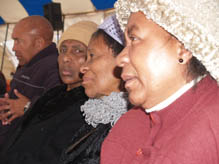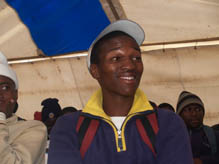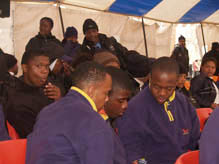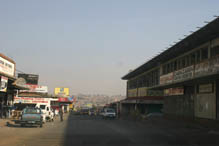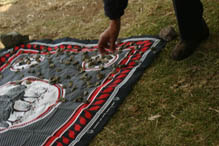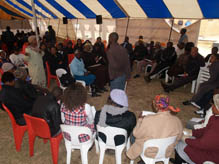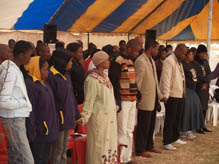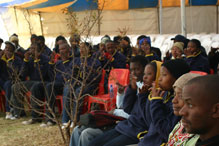
Kliptown community participate in the recent Community Conversation held in the Soweto suburb
July 14, 2008 – “Fight poverty by believing in yourself and being yourself ... I don’t need alcohol or drugs to make me who I am.” That was the message of “Super Confidence”, “sponsor” of the fictitious radio station play which was “broadcast” from Walter Sisulu Square in Kliptown, Soweto, on July 10.
The audience grew as passers-by stopped to watch the glamorous character of DJ Phat Cat showing off to his impressionable assistant. People laughed as they recognised the human weaknesses and desires we share no matter who or where we are.
Theatrical production company Hecate was at it again with the play Khululeka, entertaining the crowds while pointing to the factors that drive the spread of HIV.
Their show, and the community dialogue event the following day at the Kliptown Visitors’ Centre, were part of the Nelson Mandela Foundation’s series of Community Conversations, being held around the country to build on HIV prevention work that was started in 2007. The Conversations, organised and run by Cool Ideas 247, form part of the Foundation’s programme for Mr Mandela’s 90th birthday year.
The Kliptown venue was particularly apt because of its place in history. On June 26, 1955, the Congress of the People was held in that open space, attended by 3 000 delegates who launched the Freedom Charter. Once again, people were given a space to celebrate ideas and seek solutions to their shared problems.
On July 11, the dialogue moved to a marquee outside the nearby visitors’ centre. After weeks of talking to people in the area to gauge which social issues were of greatest concern, Cool Ideas had drawn up a programme that would allow those attending to formulate their own problems and solutions. “The answer lies within us,” Cool Ideas CEO Paddy Nhlapo explained to those present.
“You are going to be in charge of everything that’s going on,” added facilitator Lesley Nkosi. First, the group suggested and agreed on some ground rules for behaviour at the event. Then everyone was asked to introduce themselves to another person sitting near them and find out more about that person’s interests and needs. These ranged from needs for anti-retrovirals to housing and an ID book for a pensioner.
Nkosi then used a tool called “counting your losses”, part of the United Nations Development Programme methodology followed in the Conversations.
All those present were asked to take a small stone to represent someone they had lost, and place it on a cloth on the ground. As they did so, he spoke about the feelings and questions that people might be experiencing as they reflected on the toll of AIDS. “You picked up a stone, then another, and another ... Have you remembered everyone? What has to be done to put an end to this?” he asked.
People were then invited to speak and share their thoughts.
“I’ll never die like a coward,” said one HIV-positive man who described how ill he had been and how he had decided to fight back. “If I save just one or two people, I die a hero,” he said.
“The time has come to tell the truth,” said an older man, mentioning the belief among some that AIDS is the result of witchcraft.
The Cool Ideas team then started off the story of an imaginary family whose daughter, “Thoko”, was doing badly at school and eventually collapsed and was hospitalised and diagnosed as HIV-positive. The audience was organised into three groups to talk about what they would do if they were Thoko, or if they were her parents or friends or neighbours – or if they were a traditional healer.
Telling stories like this reveals common ways of understanding social life and is a tool used at every Community Conversation.
After a report-back on discussions that had raised a certain amount of debate, Nkosi identified the community’s main needs as more communication, more support and more information.
Volunteers came forward to form an action committee which planned to meet the following day. Nkosi explained that they would be given tools to help them plan a way forward, and would be introduced to the ward councillor.
The event ended with a welcome meal on a cold afternoon, as preparations continued in Kliptown for the Nelson Mandela Annual Lecture to be given the next day by Liberian President Ellen Johnson-Sirleaf.
